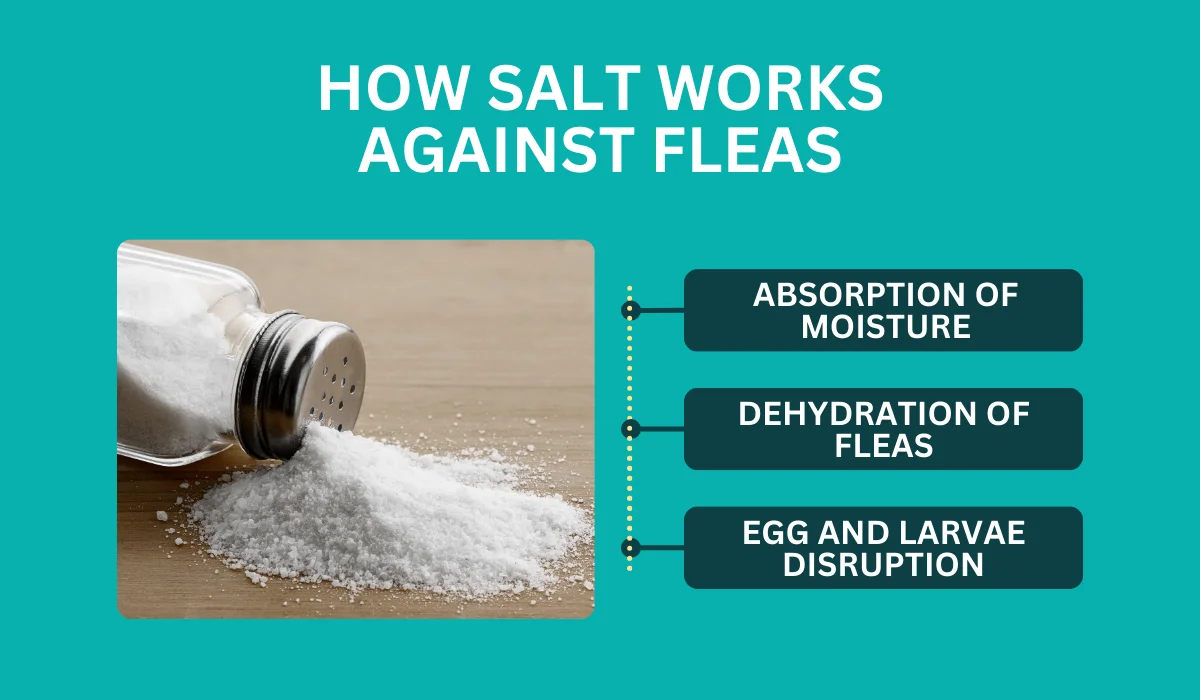Does Salt Kill Fleas?
Everyone wants a quick and easy solution to their flea problems, and salt is often rumored to be a powerful weapon against these tiny pests. But is salt kill an effective flea killer?
This question might have popped into your mind while desperately seeking remedies for your pet and home.
Keep reading to see how salt might be your next go-to solution for those persistent flea issues.
Key Takeaways
- Salt dehydrates and kills fleas by absorbing moisture, disrupting adult fleas and their life cycle.
- Its effectiveness as a flea treatment is limited due to its messiness, potential health risks, and inconsistent results.
- Professional pest control provides effective flea management with targeted treatments, surpassing DIY methods like salt.
How Salt Works Against Fleas

Both sea salt and table salt can have some effect on fleas, mainly because it dehydrates them. Here's how it works:
Absorption of Moisture: Salt acts as a desiccant, meaning it absorbs moisture from its surroundings. When applied to areas with fleas, it absorbs moisture from their bodies.
Dehydration of Fleas: As the salt absorbs moisture, it dehydrates the fleas. They cannot survive for long without adequate moisture, leading to their eventual death.
Egg and Larvae Disruption: Salt not only affects adult fleas but may also disrupt their life cycle. It may also disrupt their eggs and flea larvae, preventing them from maturing into adults.
Why Salt Isn't the Best Choice
In theory, salts can dehydrate and kill fleas. However, it's not a reliable or recommended method for complete flea control. Here’s why:
Limited Effectiveness: Salt can help dehydrate fleas. However, it doesn't always reach all the fleas in your home, as females often lay eggs in hidden spots.
Temporary Solution: Using salt to kill fleas might offer a temporary fix but rarely eliminates the problem.
Potential Mess: Spreading salt around your home can create a mess. It can get into carpets, furniture, and other areas, causing inconvenience during cleanup.
Health Concerns: Excessive salt usage can concern people or pets with certain health conditions.
Labor-Intensive: Applying salt to every infested area can be time-consuming and labor-intensive.
Not a Standalone Solution: Salt must often be combined with other natural remedies or DIY solutions to tackle a severe flea problem.
Inconsistent Results: Its effectiveness can vary. While some might find it helpful, others may not see significant results, making it an unreliable method.
How to Get Rid of Fleas in the Home
To alleviate the discomfort of flea bites in a natural way and ensure your home and pets remain safe, consider these effective methods to eliminate fleas:
- Borax: As a pesticide, sprinkle on carpets and leave for 24 hours before vacuuming. However, it must be handled cautiously.
- Diatomaceous Earth: Spread food-grade diatomaceous earth over areas to target the flea exoskeleton. If not used properly, it can be harmful to pets.
- Flea Comb: Comb through your pet's fur to remove fleas. Have a bowl of soapy water nearby to dip the comb into, which will drown the fleas.
- Baking Soda: Sprinkle baking soda on carpets and furniture. Leave it for a few hours, and then vacuum it up.
- Steam Cleaning: Use high temperatures to kill fleas and their eggs. It’s effective for carpets and upholstery.
- Dawn Dish Soap: Use a small amount in a bath for your pet. It can kill fleas on contact. Make sure to rinse thoroughly.
- Other Natural Methods: Try using lemon water spray or making a rosemary flea dip. These home remedies can be less harsh for your pet’s skin and the environment.
How to Treat Pets for Fleas
To effectively eliminate fleas from your pets, consulting professional veterinarians for appropriate treatment is necessary. They offer several specialized treatments, including:
- Flea Spray: Application of potent flea killer sprays or insecticides, safe for pets and humans.
- Oral Flea Meds: Prescription pills that pets take orally to kill or inhibit the development of fleas.
- Flea Collars: They can recommend and provide specialized flea collars that release chemicals to kill or repel fleas over several months.
- Topical Preventatives: Liquid solutions applied directly to the pet’s skin to kill fleas and prevent future infestations.
Is It Time to Call the Experts?
Sometimes, salt just doesn't cut it. Fleas can be nasty little critters. There are moments when professional help is not just a good idea but absolutely necessary.
If fleas keep returning despite your best efforts or when dealing with fleas and other pests like ticks or ants, a professional pest control company (like us at Native Pest Management) can handle them all at once.
As professionals, we come with advanced knowledge that goes beyond DIY methods. We also use insect growth regulators and more potent flea sprays to target flea infestations.
